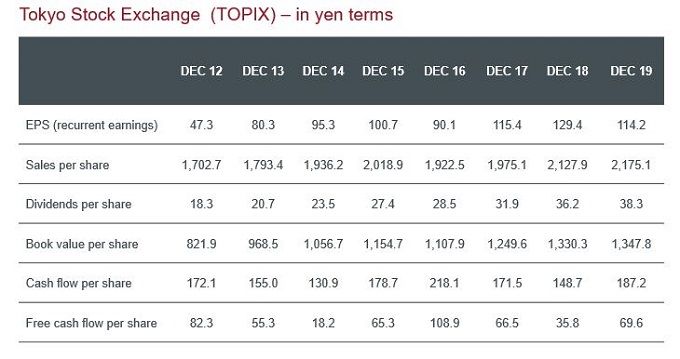
Janus Henderson Investors: Abenomics - more arrows in the quiver?
On 28 August 2020, Japanese Prime Minister Shinzo Abe announced his resignation due to health reasons. The move also signified an end to almost eight years of ‘Abenomics’, economic policies based on the ‘three arrows’ of monetary easing, fiscal stimulus and structural reforms.
11.09.2020 | 08:43 Uhr
In this Q&A, Junichi Inoue, Head of Japanese Equities and portfolio manager for the Japanese Opportunities Strategy, discusses the impact of Abenomics and the possibility of its continuation, as well as the implications of COVID on Japanese stocks.
Key takeaways
- Abenomics has benefited Japanese stocks, created jobs and resulted in a more stable economy.
- Should Suga become Abe’s successor, Abenomics is likely to continue, and could even be enhanced.
- In Junichi’s view, valuations of Japanese equities are currently attractive, and he remains focused on managing cyclicality and identifying unique opportunities that are less likely to be influenced by macroeconomic forces.
Q: What has been Abenomics’ impact on Japanese companies?
A: Abenomics began as a political accord with the Bank of Japan to ease monetary as well as fiscal policy with the aim of ending deflation and stimulating economic activity. While these efforts worked initially, it was the government’s persistence in using market forces to resolve the country’s structural issues (chronic deflation, low productivity, economic stagnation, underemployment and large government deficit), which resulted in a revival of the economy.
During Abe’s term, profits, as measured by earnings per share (EPS), of Tokyo Stock Exchange-listed companies more than doubled (Example 1) while the market has delivered an annualised total return in yen terms of 11% since Abe’s appointment to the end of August 2020 (7 years and 8 months)1.

Source: FactSet, Janus Henderson Investors, end of calendar year comparisons as at 31 December 2019. Shinzo Abe was appointed prime minister on 26 December 2012. Past performance is not a guide to future performance.
Businesses were boosted by policy support through lower financing rates as well as more stable exchange rates. Improvements in corporate governance and capital efficiency also played a key role. Listed companies were advised to improve return-on-equity (ROE) by more than 8%, and investors to play a greater role through engagement. These policies led to higher transparency of the board, clearer business strategies, higher dividend payout ratios and share buybacks, which benefited investors, and in many cases led to improved company valuations.
Abenomics has helped to create 4.5 million jobs (between 2013-2019)2, while a stable currency has helped improve the competitiveness of manufacturers; other sectors have also benefited, improving the stability of the economy.
Q: Has your strategy benefited from Abe’s policies?
A: Yes. Our portfolios have greatly benefited from Abenomics. We believe that cash flow generation from capital-efficient business creates shareholder value over time; in recent years it has become much easier to have focused discussions with management on their capital strategy. Additionally, our investment universe became wider and more diversified because of the revival of domestic non-manufacturing sectors.
Q: Long-time Abe aide, Chief Cabinet Secretary Yoshihide Suga, is the frontrunner to succeed as prime minister. Can we expect a continuation of Abenomics-style policies under Suga?
A: In our view, Suga-san will likely win the support of the Liberal Democratic Party by focusing on his support for Abe’s policies, making him the natural successor. Like Abe, he is known as being pro-market and pro-reform. If elected as prime minister, it is likely that the policies enacted in Abe’s administration will not simply continue, but could be enhanced as well.
Q: What are best case and worse case scenarios that may result from the PM’s resignation?
A: In our view, the best-case scenario, markets will recognise that Abenomics has largely worked and the probability of this continuing through the appointment of Suga should strengthen investor sentiment, supporting an argument for higher stocks valuations. Our worst-case scenario would be that the transition of power is interrupted by an external shock event that brings fiscal and monetary policy regime changes, although we would think this to be unlikely.
Q: Which sectors have suffered as a result of COVID-19, which have fared better?
A: The market has been polarised. Travel and natural resources stocks have been hit hard. The manufacturing sector also experienced severe setbacks due to collapses in supply chains. In a tougher market environment, with a shrinking market size, weak and capital inefficient companies could face closure. Those with strong business models with high capital efficiency are more resilient; examples include Z Holdings, an internet service provider, and Nitori, the home fashion retailer, which both saw increased demand during the pandemic. Computer gaming, software and certain retailers have also seen their stocks gain. Those stocks that have idiosyncratic risk characteristics are capable of performing well regardless of the macro environment, an example being Daiichi Sankyo, which recently launched a blockbuster drug for breast cancer.
Q: What do you see as a key concern for investors?
A: A key risk is that no COVID-19 vaccine is approved, and the threat of the global pandemic continues to loom over markets. So far, the global recovery has been ‘K’-shaped, meaning an unequal rebound with some markets rising and some falling. Our core holdings comprise companies that we believe to be competitive, capital efficient and with the ability to create shareholder value through strong free cash flow generation. At the same time, we are selectively allocating to competitive businesses that are under pressure amid the pandemic, but where risk and reward is asymmetrical. These companies are more likely, in our view, to be able to deliver strong returns when the economy normalises.
Q: Why should investors consider Japanese stocks right now?
A: In our view, valuations of Japanese equities currently seem attractive. Japan has always been a geared play for global economic recovery, and this time is no exception. As long-term investors we remain focused on managing cyclicality and identifying unique opportunities that are likely to be influenced by macroeconomic forces.
1Source: FactSet, Janus Henderson Investors. Annualised total return in yen terms for the TOPIX between 31 December 2012 and 31 August 2020. Past performance is not a guide to future performance.
2Source: e-Stat, Japan government statistics portal, as at 31 December 2019. Refers to the period from 2012 when Abe entered office to 2019.




Diesen Beitrag teilen: